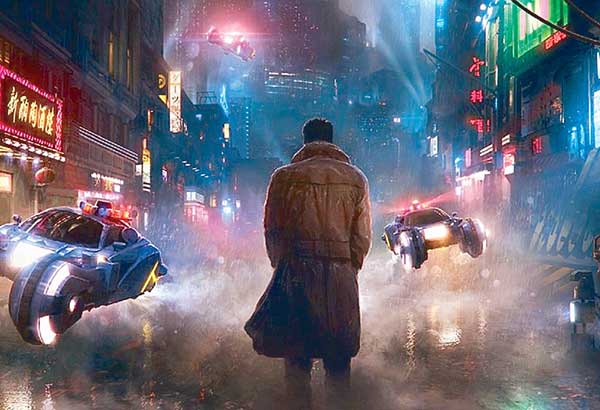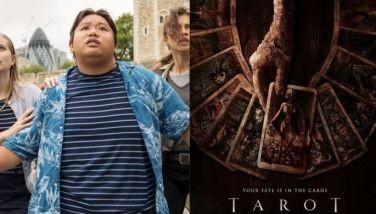The essence of existence

Set in 2049, or 30 years after the first movie, the dystopia has gotten worse. Replicants have become more advanced and are able to blend unnoticed with real humans.
Film review: Blade Runner 2049
MANILA, Philippines — “I’ve seen things you, people, wouldn’t believe. Attack ships on fire off the shoulder of Orion. I watched C-beams glitter in the dark near the Tannhäuser Gate. All those moments will be lost in time, like tears in rain. Time to die.”
So went the final soliloquy of the replicant Roy Batty (played by Rutger Hauer), in the original Blade Runner, a dark and richly poetic groundbreaking work of science fiction, whose thematic espousal of existential issues finds continuation and expansion in a sequel made more than three decades later.
Set in 2049, or 30 years after the first movie, the dystopia has gotten worse. Replicants — artificial humans — have become more advanced and are able to blend unnoticed with real humans. After a “blackout” has erased data about earlier replicants, Blade Runners — the movie’s titular characters, which belong to a special unit of the Los Angeles Police Department — have their work cut out for them: They must hunt down undocumented older model replicants who have rebelled by running away and hiding under assumed identities. Ryan Gosling plays Blade Runner “Officer K,” who is undoubtedly a replicant (unlike Harrison Ford’s Blade Runner character, of which the jury is still out after 35 years). The movie opens with “K” hunting down a renegade replicant played by Dave Bautista, whose killing results in the unearthing of a long-hidden secret: A replicant has given birth to a child, the first of its kind.
This discovery, under the societal milieu of the movie, is earth-shaking, to say the least. K’s boss, played by Robin Wright (wasted in the movie as a mere plot device), asks K to keep the information under wraps, while at the same time orders him to find the child. The conglomerate that manufactures replicants also wants the child, but for a different agendum: They want to know how replicants can be made to reproduce, so that they can be manufactured at a faster rate to keep up with demand. What follows is a slow-burning “thriller” that does not so much raise your pulse rate, but rather provides incisive, scathing commentaries on the alienation brought about by modern technology; the commercialization of human needs (including companionship and sexual desires); discrimination based on superficial bases; and the slow, consuming demise of humanity.
While the movie was no longer directed by Ridley Scott, Denis Villanueve has hewed faithfully to the paradigmatic visuals of the future world concretized by Scott in the original. Dimly-lit (because of constant rains brought by climate change), cloaked in eternal smog, littered with industrial waste and with towering buildings on which emanate three-dimensional product advertisements, the atmosphere is extremely apropos for its noir subject.
The themes played out are also a seamless continuation of the genetic leitmotifs of the initial work, and would go further by expanding its concepts and attempting to answer the questions it raised, the most important of which are what happened to Ford’s original Blade Runner Deckard — and also whether he was replicant or not — and the fate of replicants in the future.
The answers — or lack thereof — are laid out by an exceedingly talented cast that almost never missed a beat. Ryan is appropriately angst-ridden and becomes increasingly so as the discovery of the “miracle” wears him down; his achievement in the film is managing to keep a treasure-trove of complex emotions behind a translucent façade of stoicism. His sole means of solace is Joi (played by the achingly beautiful Cuban actress Ana de Armas), a virtual-reality holographic girlfriend, who begins to experience feelings after K buys a device called an “Emanator” that allows her to accompany K outside of the four corners of his apartment, sort of like a futuristic pocket wi-fi. Armas is a delight to watch; aside from her good looks and quiet sensuality, she plays her role as a synthetic being of mere artificial intelligence who slowly gains empathy, with such richness yet restraint, that it is easy to commiserate with her, especially when her “existence” is terminated. Wallace, the quintessential greedy corporate mogul, was played by Jared Leto convincingly, if a little over-the-top at times. The villainess Luv, played by Sylvia Hoeks, is sufficiently physical, agile and cooly menacing, an antagonist that will stand the test of time. Ford, reprising the role of Deckard, is of course consistent with that character, although his role here is more impassive as far as the film is concerned.
While one need not have seen the first Blade Runner to appreciate the abundant textures and layers of the sequel, it would help, if only to provide a sense of parallelism that would give a feeling to the viewer that the threads of the first have looped around themselves and come full circle, at least in certain respects. The earlier work started in a killing and ended in death, as does this one. And yet, the sequel is more prosaic: Tt does not have the lyrical power of Hauer’s death scene, wherein the tragic spectacle of a mere simulated human, in coming to terms with his death, embraces the seed of humanity within and the essence of life. In his own death scene, however, K tells the audience that humanity does not come simply from being human, but by acting human: By choosing to sacrifice one’s self for another, higher purpose, perfectly mirroring Batty’s choice to save his hunter Deckard instead of killing him, as a final act of striving to become human. Indeed, as Jean Paul Sartre said, existence preceding essence: Choice determining character.
- Latest
- Trending




























 Exclusive
Exclusive